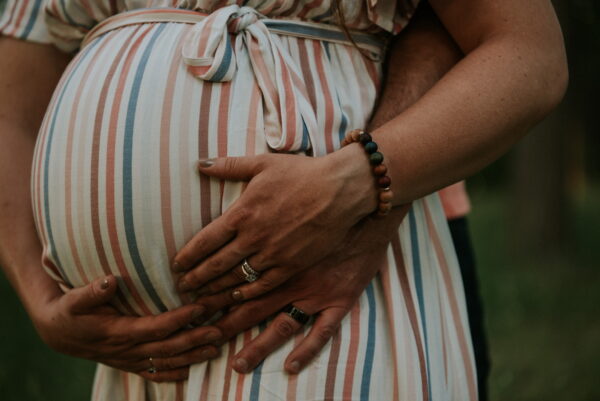As a pelvic health physical therapist, I have a deep passion for helping women. I’ve dedicated my career to bettering my knowledge and understanding of women’s pelvic health through becoming a board-certified women’s health clinical specialist and authoring “Between the Hips: A Practical Guide for Women.” I felt well-equipped to provide my patients with compassionate, exceptional care.
However, on July 24, 2020, my life was changed forever. It was our first OB appointment. I was 10 weeks pregnant. The appointment went nothing like we had imagined. There was no heartbeat, our baby wasn’t growing, and I was likely going to miscarry. I had two more ultrasounds spaced out over two weeks, both confirming no growth and no heartbeat. On Aug. 7, I needed a D and C (dilation and curettage), and I left the hospital without my baby, completely alone in my body.

A miscarriage. It’s something you hear about, but never actually imagine happening to you. My doctor told me that one in four pregnancies results in a miscarriage, but this value is likely underreported due to women miscarrying and not even knowing, just assuming they’re having a late period. Despite knowing how often this happens, I still felt alone and hopeless. I immediately thought back to my past patients who had shared their miscarriage and infertility struggles with me. I now truly understood their pain, and felt terrible for not inquiring more about their mental health. I wish I had done a better job offering referrals to resources such as counselors or support groups.
My recovery took about six weeks. It was painful—both physically and emotionally. I felt moments of gratitude, thankful to have been pregnant. I felt moments of lows, angry and confused as to why this had happened. I debated starting counseling, but with my stubborn nature, I decided I would push through and be fine.
On Nov. 16, I experienced my second miscarriage, at six weeks. There are no words for how devastated I was. My doctor told me this could be “bad luck,” and nothing could be done until I’d had three miscarriages. I couldn’t imagine going through this again, so I switched doctors, underwent genetic testing, and began counseling for my mental health. I also looked back on my menstrual cycle tracking records, something I learned from the book “Taking Charge of Your Fertility” by Toni Weschler. I highly recommend this book to anyone looking to better understand their body and menstrual cycle.

Thankfully, my genetic testing came back normal. However, upon reviewing my menstrual cycle charts, I realized my luteal phase, which is the second phase of the menstrual cycle occurring after ovulation, was too short. This can be an indicator of low progesterone. I discussed this with my new doctor, who agreed but also wanted to rule out uterine cysts and fibroids, which would be done shortly after my next menstrual cycle.
To my disbelief, I never got my next menstrual cycle because I was pregnant again, and I was terrified. I immediately started progesterone suppositories in the hopes that this would help sustain my pregnancy. On Dec. 29, for the first time, I saw my baby’s heartbeat. I was overjoyed and grateful beyond measure. Our sweet baby boy, William, was born on Aug. 27, 2021. He is such a fighter, truly a miracle, and he is my greatest blessing.
I look back on my pregnancy and feel immense gratitude but cannot ignore the deep-rooted fear and anxiety that those nine months brought me. I was constantly worrying if my baby would make it. When one suffers a loss or struggles with infertility, the pain may never truly go away, but it can be worked through. I wanted a baby so badly that when that was taken from me after my miscarriages, I felt a type of pain and emptiness that I hadn’t imagined possible. I know I’m not alone in this feeling.
I hope other women facing fertility issues know they’re not alone. October is Pregnancy and Infant Loss Awareness Month, but we need more than this one month to feel supported. Similar to all pelvic health topics (bladder issues, bowel issues, pelvic pain), infertility is something we tend to avoid talking about. Maybe it’s because we don’t know what to say to someone who is going through these issues. Maybe we feel uncomfortable sharing our infertility struggles because we don’t want to burden anyone with our pain or make anyone else feel uncomfortable. What I’ve realized, however, is that being able to talk about my experience takes some of the power from the ache it still leaves in my heart.
